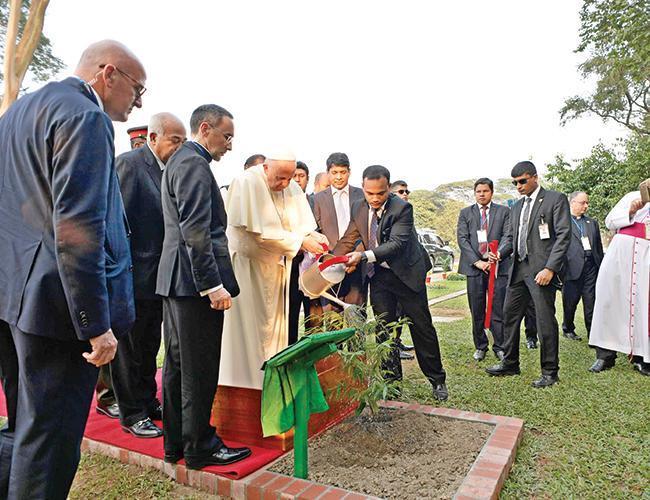
Pope Francis on Nov. 30 called for “decisive measures” to resolve the political crisis causing Muslim refugees from neighboring Myanmar to flee to Bangladesh.
But, just as in the first leg of his trip in Myanmar, he did not use the word Rohingya, which is contested by the Yangon government and military.
“It is imperative that the international community take decisive measures to address this grave crisis, not only by working to resolve the political issues that have led to the mass displacement of people, but also by offering immediate material assistance to Bangladesh in its effort to respond effectively to urgent human needs,” the pope said in a speech as he began a visit to Bangladesh.
Pope Francis made his comments shortly after arriving from Myanmar, where he walked a diplomatic tightrope, staying away from allegations that the army is waging an ethnic cleansing campaign against Rohingya Muslims despite pressure to publicly confront the incendiary issue. He praised Bangladesh for taking in the refugees who have flooded across the border on an unprecedented scale since a fresh outbreak of violence in their native Rakhine state.
But as in Myanmar, he refrained from using the word “Rohingya,” instead referring to “refugees from Rakhine state.”
Pope Francis had been urged not to use the name in Myanmar to avoid provoking hardline Buddhists and making the country’s Catholic community a target.
“None of us can fail to be aware of the gravity of the situation, the immense toll of human suffering involved, and the precarious living conditions of so many of our brothers and sisters, a majority of whom are women and children, crowded in the refugee camps,” the pope said.
Meanwhile, Myanmar must guarantee “equal rights” for everyone in troubled Rakhine state as talks on repatriation of more than 620,000 Rohingya Muslims who have fled to Bangladesh gather steam, the new EU ambassador to the country said yesterday.
Kristian Schmidt, who took over the European Union mission in Yangon some two months ago, also called on the administration of Nobel peace laureate Aung San Suu Kyi to “break down barriers” between Buddhist and Muslim communities in Rakhine.
Schmidt said Myanmar must address the “root causes” of the Rakhine crisis, such as decades-long discrimination against the Rohingya population that included restrictions on movement and lack of access to proper education.